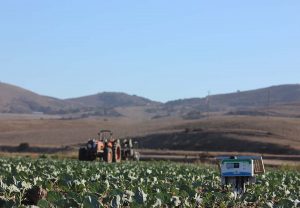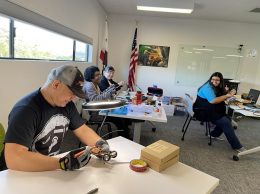SLO company helps growers manage water use

Freshway Farms in Santa Maria uses Hortau’s smart irrigation management system in its broccoli fields.
Hortau Irrigation Management Systems drummed up funds for new research and development, allowing it to take its technology to the Pacific Northwest.
Headquartered in San Luis Obispo, the agriculture technology company completed a third round of financing in two years, netting $10 million. With the money, Hortau hired additional staff in Washington state and plans to expand its presence from the Central Coast into the Midwest.
“That investment is just to accelerate everything we’ve seen,” CEO Jocelyn Boudreau said. “There’s been good growth in California in the last two years.”
Hortau plans to bulk up its technical team and the grower support that educates farmers on how to integrate the irrigation management systems into their production, said Marketing Director Brian Miln.
“It seems kind of counterintuitive at first, technology and agriculture, but we’ll see it more and more,” Boudreau said. “Both worlds are coming together right now.”
Both Miln and Boudreau highlighted the fast-growing market in applications for Internet of Things technologies, opening up pathways of research for the company.
Will Gerry, of California Coastal Blueberries, said he uses the management system to monitor soil moisture at two depths as well as air humidity, air temperature and soil temperature.
“It tells me a lot about stress on the plant,” Gerry said. “No matter where I am, this is all uploaded to the cloud and I can pull down this information anywhere. I can communicate to my guys if I see something we need to work on or we forgot or if we over-irrigated.”
Hortau sensors measure crop conditions in real time, using soil tension to tell growers when to water and how much. Growers use around 25 percent less water and the information can help reduce other inputs, like pesticides, Miln said.
“If you’re going to spend the money on fertilizer, you want to make sure the plant has every opportunity to use it,” Gerry said. “If you over-irrigate, some of that fertilizer is going to be outside the root zone. In some cases you can cut back just because you’re delivering it to the right spot.”
The company already has technology for more direct fertilizer and pesticide reduction in its R&D pipeline, Boudreau said, and wants to manage more aspects of crop production in the long term.
It’s a little like preventative medicine, he said.
“If you work on the prevention side, you can’t avoid it altogether but you can avoid a lot of it. Making sure the crop stays healthy and the conditions for growth are good, you can really cut back.”
Automation is also in the forecast for irrigation management systems.
“There’s a lot to be done, we just need to do it in a way that’s simple enough,” Boudreau said. “We have to harness the possibilities of the technology so it’s not adding to the task, it’s simplifying it.”
Data analytics have become increasingly important for Hortau. Not only will more of its systems water automatically, it plans to develop forecasting software to predict the amount of water or nutrients a plant will need and stream external information, like weather patterns, into the system.
Only so many sites have sensors in the soil, Gerry said, so similar soil areas involve a little guesswork and careful monitoring.
The data has already helped him track trends. It doesn’t replace being in the field, he said, but it provides backup and precision for his intuition.
“You can get incredible equipment sometimes but if you don’t have someone to fall back on, adjust it if it needs adjustment, you lose some of the advantage and these folks have been great,” Gerry said. “It was simple to integrate because you’re working it into what you’re always trying to accomplish.”
Hortau leveraged its network within the sector to attain the financing. The investment came from a group including Advantage Capital Agribusiness Partners, a licensed Rural Business Investment Company, and BDC Capital. Returning Canadian investors also contributed.
Finding the right investors was important to Boudreau.
“If you don’t see the future the same way, if you don’t have the same vision, it can become a nightmare,” he said. “It’s like a marriage. You just have to want to accomplish the same things.”
• Contact Marissa Nall at [email protected].











